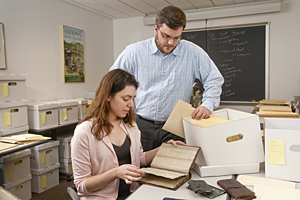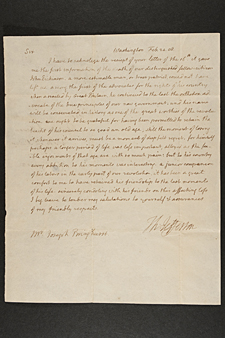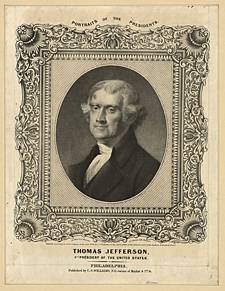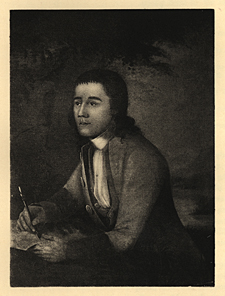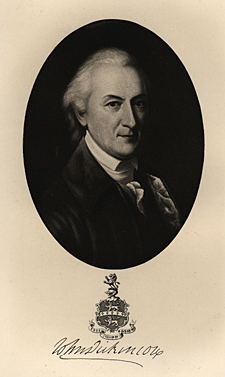Javascript is required to view this video
ADVERTISEMENT
- Rozovsky wins prestigious NSF Early Career Award
- UD students meet alumni, experience 'closing bell' at NYSE
- Newark Police seek assistance in identifying suspects in robbery
- Rivlin says bipartisan budget action, stronger budget rules key to reversing debt
- Stink bugs shouldn't pose problem until late summer
- Gao to honor Placido Domingo in Washington performance
- Adopt-A-Highway project keeps Lewes road clean
- WVUD's Radiothon fundraiser runs April 1-10
- W.D. Snodgrass Symposium to honor Pulitzer winner
- New guide helps cancer patients manage symptoms
- UD in the News, March 25, 2011
- For the Record, March 25, 2011
- Public opinion expert discusses world views of U.S. in Global Agenda series
- Congressional delegation, dean laud Center for Community Research and Service program
- Center for Political Communication sets symposium on politics, entertainment
- Students work to raise funds, awareness of domestic violence
- Equestrian team wins regional championship in Western riding
- Markell, Harker stress importance of agriculture to Delaware's economy
- Carol A. Ammon MBA Case Competition winners announced
- Prof presents blood-clotting studies at Gordon Research Conference
- Sexual Assault Awareness Month events, programs announced
- Stay connected with Sea Grant, CEOE e-newsletter
- A message to UD regarding the tragedy in Japan
- More News >>
- March 31-May 14: REP stages Neil Simon's 'The Good Doctor'
- April 2: Newark plans annual 'wine and dine'
- April 5: Expert perspective on U.S. health care
- April 5: Comedian Ace Guillen to visit Scrounge
- April 6, May 4: School of Nursing sponsors research lecture series
- April 6-May 4: Confucius Institute presents Chinese Film Series on Wednesdays
- April 6: IPCC's Pachauri to discuss sustainable development in DENIN Dialogue Series
- April 7: 'WVUDstock' radiothon concert announced
- April 8: English Language Institute presents 'Arts in Translation'
- April 9: Green and Healthy Living Expo planned at The Bob
- April 9: Center for Political Communication to host Onion editor
- April 10: Alumni Easter Egg-stravaganza planned
- April 11: CDS session to focus on visual assistive technologies
- April 12: T.J. Stiles to speak at UDLA annual dinner
- April 15, 16: Annual UD push lawnmower tune-up scheduled
- April 15, 16: Master Players series presents iMusic 4, China Magpie
- April 15, 16: Delaware Symphony, UD chorus to perform Mahler work
- April 18: Former NFL Coach Bill Cowher featured in UD Speaks
- April 21-24: Sesame Street Live brings Elmo and friends to The Bob
- April 30: Save the date for Ag Day 2011 at UD
- April 30: Symposium to consider 'Frontiers at the Chemistry-Biology Interface'
- April 30-May 1: Relay for Life set at Delaware Field House
- May 4: Delaware Membrane Protein Symposium announced
- May 5: Northwestern University's Leon Keer to deliver Kerr lecture
- May 7: Women's volleyball team to host second annual Spring Fling
- Through May 3: SPPA announces speakers for 10th annual lecture series
- Through May 4: Global Agenda sees U.S. through others' eyes; World Bank president to speak
- Through May 4: 'Research on Race, Ethnicity, Culture' topic of series
- Through May 9: Black American Studies announces lecture series
- Through May 11: 'Challenges in Jewish Culture' lecture series announced
- Through May 11: Area Studies research featured in speaker series
- Through June 5: 'Andy Warhol: Behind the Camera' on view in Old College Gallery
- Through July 15: 'Bodyscapes' on view at Mechanical Hall Gallery
- More What's Happening >>
- UD calendar >>
- Middle States evaluation team on campus April 5
- Phipps named HR Liaison of the Quarter
- Senior wins iPad for participating in assessment study
- April 19: Procurement Services schedules information sessions
- UD Bookstore announces spring break hours
- HealthyU Wellness Program encourages employees to 'Step into Spring'
- April 8-29: Faculty roundtable series considers student engagement
- GRE is changing; learn more at April 15 info session
- April 30: UD Evening with Blue Rocks set for employees
- Morris Library to be open 24/7 during final exams
- More Campus FYI >>
10:01 a.m., Dec. 3, 2009----Two University of Delaware graduate students working in archives recently acquired by the University of Delaware Library have discovered a letter written by Thomas Jefferson about the death of another prominent Colonial figure, John Dickinson.
The letter was found in the archives of the Rockwood Museum, which the Library received as a gift from New Castle County earlier this year. Located in Wilmington, the Rockwood Museum is a Victorian house museum, with a conservatory and furnishings from the 19th and 20th centuries.
Graduate students Amanda Daddona and Matt Davis are processing the Rockwood archive, which is huge and diverse, with thousands of documents, maps, letters, photographs, albums, diaries, deeds, business records, ephemera and other items from the 17th century until the late 1970s. It may be assumed that many, if not most, of the older items in the collection have not been examined for several decades or longer.
On Thursday, Nov.5, they found an original letter written by Thomas Jefferson among the many boxes of unsorted early material of the Bringhurst family, the original family that owned Rockwood. The Jefferson letter has substantive content with a distinct Delaware connection and was written during the time Jefferson was president.
The letter, dated Feb. 24, 1808, was posted from Washington and addressed to Dr. Joseph Bringhurst, who had informed Jefferson, in a letter of Feb. 16, 1808, about the recent death, in Wilmington, of John Dickinson on Feb. 14, 1808. Jefferson's letter is an eloquent tribute and expression of condolence on the loss of Dickinson: “a more estimable man, or truer patriot, could not have left us.”
Jefferson said Dickinson was “among the first of the advocates for the rights of his country when assailed by Great Britain” and “one of the great worthies of the revolution.” Jefferson described himself in relation to Dickinson as a “junior companion of his labors in the early part of our revolution” and he noted “it is a great comfort of his labors in the early part of our revolution” and “it is a great comfort to me to have retained his friendship to the last moment of his life.”
In addition to the Thomas Jefferson letter, Daddona and Davis found two John Dickinson letters, which are notable in their own right. Dickinson was known as the “Penman of the Revolution” for his early “Letters from a Farmer in Pennsylvania to the Inhabitants of the British Colonies,” which argued the cause of American liberty and were read on both sides of the Atlantic. Dickinson served in the Continental congresses and in 1781 was elected president of Delaware, a position he resigned to be elected president of the Supreme Executive Council of Pennsylvania. Dickinson worked with James Madison on the Articles of Confederation and was a delegate to the Constitutional Convention of 1787.
John Dickinson and his wife were intimate friends of Wilmingtonians Dr. Joseph Bringhurst and his wife Deborah (Ferris), who named their daughter Mary Dickinson Bringhurst when she was born in 1806. Joseph Bringhurst (1767-1834) practiced medicine and established a drug business on Market Street that was carried on as a family business for more than a century. He attended John Dickinson in his final illness, recording notes from those days that served future biographers. Bringhurst was the first to inform Jefferson of Dickinson's death.
“Processing a Special Collection is a process of discovery,” said Susan Brynteson, vice provost and May Morris Director of Libraries. “What a thrill for the graduate students who discovered this during their work at the University of Delaware Library! A memory always to be cherished.”
Daddona, a graduate student in the Department of History from East Hartford, Conn., said she was astonished when she discovered the Jefferson letter. “Just two weeks ago, I was very excited to find a group of letters from a freedman in Liberia writing to Joseph and Deborah Bringhurst in the 1830s. It has been quite an adventure going through these documents. Deborah Bringhurst bundled some letters together and wrote little notes that explained their significance, almost like she knew we'd be doing this one day. The whole reason I am interested in history is because of my earlier studies of Thomas Jefferson, so I couldn't believe it when I found this letter.”
“Finding this letter was an unexpected surprise, as the bulk of the collection focuses on the more recent history of the Bringhurst family, particularly as it relates to their ownership of the Rockwood estate,” said Davis, who is a graduate assistant from the Department of Political Science and International Relations from Wilmington and who holds the John Sweeney Fellowship at the University of Delaware Library, sponsored by the Friends of Rockwood. “Although I was aware that the Bringhursts were a well established Quaker family, finding these letters brought home the interconnectedness of the early Republic, and the fact that at that time it really was a small world. These early Bringhurst papers offer important insights into the cultural and social history of the period, Quaker religious history, local and national politics, and even the anti-slavery movement. The Jefferson and Dickinson papers are showcase pieces, but in many ways they're just the tip of the iceberg of the historical sources in this archive.”
“This is such a wonderful experience for Amanda and Matt. The graduate assistantship program really opens campus learning as students are exposed to the importance of historical resources and how they are managed in a research library. At the same time, the Library benefits from the academic focus and research skills that each graduate student brings and the communication they foster with their departments to share information about sources in the Library,” said L. Rebecca Johnson Melvin, librarian in the Special Collections Department in the Library.
The letter by Jefferson was known to exist and is included in inventories of Jefferson's correspondence. However, because the letter was in private hands, the location of the original was unknown until this discovery. The complete text and verbatim text of the letter follows:
Sir Washington, Feb. 24. 08
I have to acknolege the reciept of your letter of the 16th. It gave me the first information of the death of our distinguished fellow-citizen, John Dickinson. A more estimable man, or truer patriot, could not have left us. Among the first of the advocates for the rights of his country when assailed by Great Britain, he continued to the last the orthodox advocate of the true principles of our new government: and his name will be consecrated in history as one of the great worthies of the revolution. We ought to be grateful for having been permitted to retain the benefit of his counsel to so good an old age; still, the moment of losing it, whenever it arrives, must be a moment of deep felt regret. For himself perhaps a longer period of life was less important, alloyed as the feeble enjoyments of that age are with so much pain: but to his country every addition to his moments was interesting. A junior companion of his labors in the early part of our revolution, it has been a great comfort to me to have retained his friendship to the last moments of his life. Sincerely condoling with his friends on this affecting loss, I beg leave to tender my salutations to yourself & assurances of my friendly respects.
Th. Jefferson
Mr. Joseph Bringhurst
Editor's note: To zoom in and read the letter close up, visit the Special Collections Web page that also includes a brief biography of Joseph Bringhurst and an annotated bibliography.



